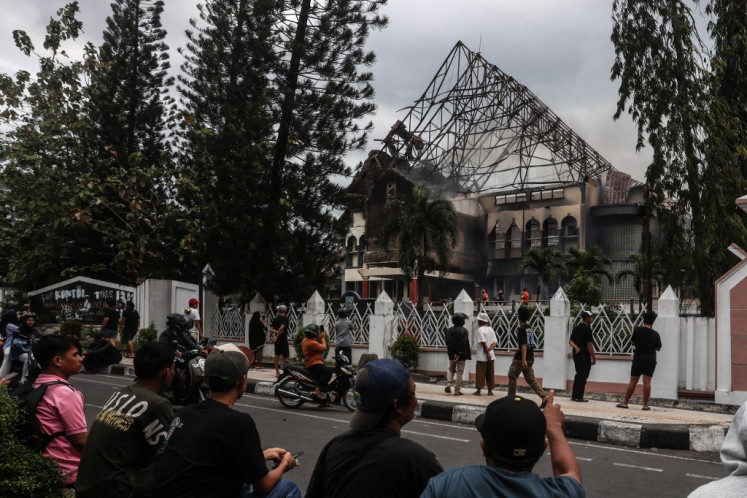Popular Reads
Top Results
Can't find what you're looking for?
View all search resultsPopular Reads
Top Results
Can't find what you're looking for?
View all search resultsInsight: President Obama and Indonesia
Finally, US President Barack Obama will visit Indonesia — after twice cancelling his plans due to domestic political issues
Change text size
Gift Premium Articles
to Anyone
Finally, US President Barack Obama will visit Indonesia — after twice cancelling his plans due to domestic political issues.
As Endy Bayuni wrote earlier in The Jakarta Post, previous cancellations have dampened euphoria for the visit. However, this visit is even more important now for two reasons.
The strategic dynamics of East Asia have changed with the rise of China, especially after the Chinese successfully weathered the 2008 financial crisis. The West, including the US, have not fared as well.
The US will need a long time to overcome the depth of the crisis and its impact.
The current rhetoric from the Chinese, which sounds more assertive and sometimes even aggressive, has puzzled the region.
The Chinese might have a point to resist US pressures, such as to revaluate the yuan to reduce imbalances. They could do it with finesse and nuance.
This is at least expected from a big power that is self-confident and knows what it wants. One can always cooperate to find solutions, especially if one is in a better and more powerful position.
In the end, while China has elevated its stature globally, it is still limited in the economic realm. I assume Deng Xiaoping’s advice from some decades ago is still valid: Don’t have hubris, don’t be over-confident — and play your strengths with care.
China is trying to do better in its rhetoric. We have to understand the domestic pressures its government must respond to and the emotions (on both sides) engendered by its problems with Japan on disputed islands.
US Secretary of Defense Robert M. Gates said in Hanoi that “the US is a resident power”. It was an important statement to re-convince the world that the US has always been an East-Asian power as well as an Asia-Pacific one. President Obama understands it. He also understands that given new global and regional strategic developments, the US can no longer go it alone to solve critical problems. It must depend on allies and friends.
For Indonesia, a US presence in East Asia is important so Indonesia has the option to implementing a free and independent foreign policy. It is also important for other small and middle-sized countries to pursue their national interests in East Asia.
The mid-term elections in the US show how difficult it is for the US to change, especially now that the country is really facing difficulties and limitations.
But that is exactly the second reason why the Indonesain visit is so important, namely to show to the Americans back home that there is no way the US alone can solve the global and regional problems.
Willy-nilly solutions will impact and influence the US’ well-being and its economic recovery. Indonesia is one country in this part of the world that can play a role to help the US solve its huge economic challenges and problems.
That is also an important reason why it is Indonesia’s national interest, as formulated in the
comprehensive partnership agreement, to make the visit a success. However, both Indonesia and the US need to cooperate closely to make it happen.
In the end our bilateral relations with the US are important not only for East Asia and the US, but also for the world.
Indonesia will be the chairman of ASEAN in 2011 and it will be the first time that the US will be part of an East Asian regional institution, namely the East Asian Summit (EAS), or ASEAN Plus 8. This forum will discuss and decide on strategic issues, including hard traditional security matters, which is now even more important due to new strategic developments.
Its deliberations will be implemented by the other existing institutions: the ASEAN Regional Forum (ARF) for Confidence building measures (CBMs) and non-traditional security issues, traditional
security issues at the ASEAN Defense Ministers Meeting Plus (ADMM Plus) and functional cooperation, including economic ones, at the APT or ASEAN Plus Three and in APEC.
Indonesia therefore has an important role to play to introduce the US into the EAS. This will be an important topic for Obama’s visit.
The East Asian Summit hopefully will support and help efforts to create peace and stability in East Asia, which is becoming critical for supporting economic growth and developing this most dynamic part of
the world.
The writer is Vice Chair, Board of Trustees, CSIS Foundation.










